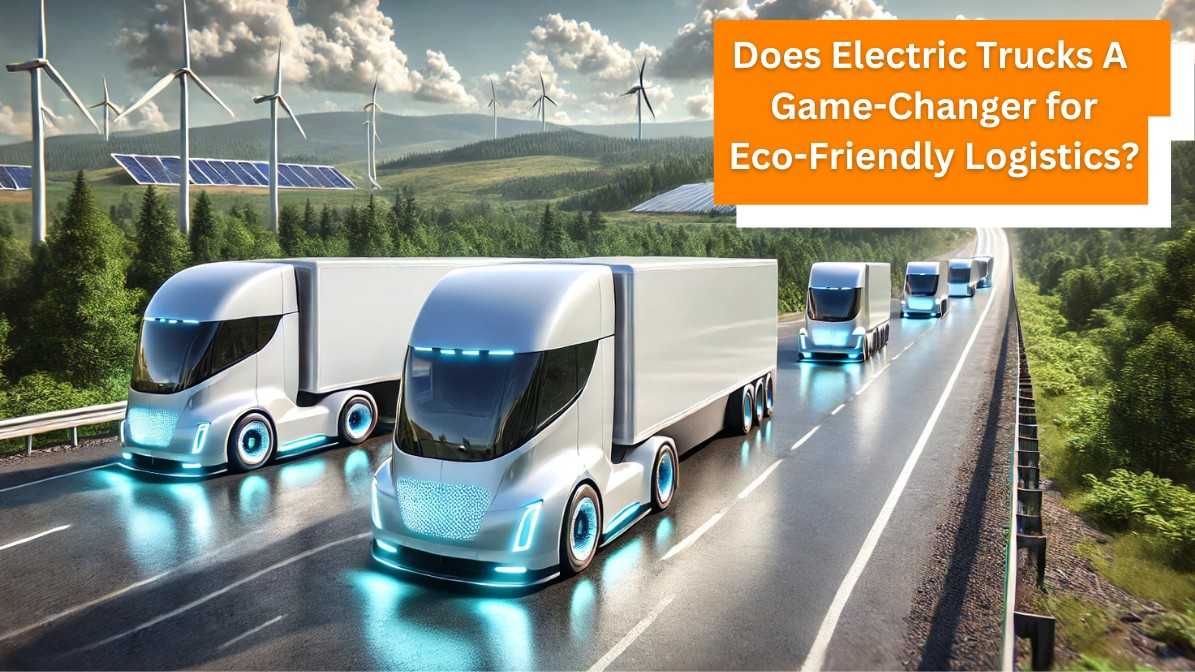How electric trucks are transforming logistics and why they’re the future of eco-friendly transportation. Whether you’re a business owner or just curious about this innovative trend, stick around to learn everything about electric trucks.
What Are Electric Trucks?
Electric trucks are vehicles powered entirely by electric batteries rather than internal combustion engines. They’re designed to carry goods while minimizing environmental impact. Unlike traditional trucks, they run on electricity stored in rechargeable batteries, which eliminates direct emissions.
How Transportation Affects the Environment
Transportation plays a huge role in global greenhouse gas emissions. Traditional diesel trucks contribute significantly to air pollution and carbon footprints, making logistics one of the leading causes of environmental degradation. From smog in cities to increasing global temperatures, the impact of transportation is undeniable.
Why the Demand for Green Solutions Is Growing
As the effects of climate change become more evident, the world is demanding eco-friendly solutions. Consumers, governments, and corporations are pushing for greener practices, and the logistics sector is no exception. This makes interest in sustainable alternatives like electric trucks.
The Future of Logistics Is Electric
Logistics is the backbone of modern economies, but traditional transportation methods are taking a toll on the environment. Diesel-powered trucks, while reliable, are major contributors to pollution and greenhouse gases. Electric trucks—a revolutionary alternative that’s shaking up the industry. These vehicles promise not only to reduce emissions but also to lower costs and improve the overall experience for drivers.
we’ll explore the benefits, challenges, and future of electric trucks in logistics. Let’s start by understanding the environmental impact of transportation.
Transportation accounts for a significant share of global greenhouse gas emissions. Trucks, particularly diesel-powered ones, emit high levels of carbon dioxide (CO₂), nitrogen oxides (NOx), and particulate matter. These pollutants harm air quality, contribute to climate change, and negatively affect public health.
Do you know? One diesel truck can emit as much pollution as 40 passenger cars! That’s why finding greener alternatives is more urgent than ever.
The Rising Demand for Green Solutions
As consumers and governments prioritize sustainability, the demand for green transportation solutions is skyrocketing. Logistics companies are under pressure to reduce their carbon footprints while maintaining efficiency. Electric trucks are stepping in as the perfect solution, offering a clean, innovative way to meet these demands.
Reducing Carbon Emissions with E-Trucks
Zero Emissions: A Breath of Fresh Air
The biggest advantage of electric trucks is that they produce zero tailpipe emissions. This means no CO₂, NOx, or other harmful gases are released into the atmosphere during operation. It’s a game-changer for urban areas, where air pollution from heavy vehicles is a persistent problem.
2. Lower Carbon Footprints
By running on electricity—especially when sourced from renewable energy—electric trucks drastically reduce the carbon footprint of transportation. Companies adopting these vehicles contribute to a healthier planet.
Advantages of Electric Trucks
Electric trucks come with a range of benefits that go beyond environmental impact. Let’s explore some of the key advantages:
1. Lower Operational Costs
Electric trucks are much cheaper to operate compared to diesel trucks. Electricity is less expensive than diesel fuel, and with fewer moving parts, maintenance costs are also significantly reduced. Over the vehicle’s lifetime, these savings add up to substantial cost advantages.
2. Better Driver Experience
Drivers of e-trucks often report a better overall experience. Why? They’re quieter, smoother, and easier to drive. The instant torque provided by electric motors makes acceleration more responsive, while the lack of engine vibrations reduces driver fatigue.
Challenges Facing Electric Trucks in Logistics
While E-trucks are promising, they do face a few hurdles:
1. Limited Range and Weight Capacity
Most electric trucks currently offer a range of 150-300 miles per charge, which may not be sufficient for long-haul routes. Additionally, the heavy batteries can reduce the payload capacity, making them less efficient for certain types of freight.
2. Availability of Charging Infrastructure
Charging infrastructure is still in its infancy compared to diesel fueling stations. While cities are expanding their charging networks, rural and remote areas often lack adequate facilities, creating challenges for logistics companies.
Comparison: Electric Trucks vs. Diesel Trucks
To better understand the benefits and limitations of E-trucks, let’s compare them to their diesel counterparts in key areas.
| Feature | Electric Trucks | Diesel Trucks |
|---|---|---|
| Emissions | Zero tailpipe emissions | High CO2 and particulate emissions |
| Fuel Costs | Lower (electricity is cheaper) | Higher (diesel is expensive) |
| Maintenance | Fewer moving parts, lower costs | Regular servicing, higher costs |
| Range | 150-300 miles per charge | 500+ miles per tank |
| Noise | Quieter operation | Loud engine noise |
| Price | $150,000 – $300,000 | $70,000 – $120,000 |
The Future of Electric Trucks in Sustainable Logistics
The future of logistics looks electrifying! Here’s what’s driving the shift:
1. Government Initiatives and Incentives
Governments worldwide are offering subsidies, tax credits, and grants to encourage businesses to adopt E-trucks. For example, California’s Hybrid and Zero-Emission Truck and Bus Voucher Incentive Project (HVIP) provides financial support for fleet electrification.
2. Technological Advancements
Battery technology is advancing rapidly, with innovations like solid-state batteries offering greater range and faster charging times. Companies are also developing lightweight materials to improve payload capacity and efficiency.
Conclusion
Electric trucks are transforming logistics into a cleaner, more sustainable industry. They address the environmental challenges posed by traditional diesel trucks while offering cost savings and an improved driver experience. While challenges like range and infrastructure remain, technological advancements and government support are paving the way for a bright future.
If you’re a business owner, now is the time to consider making the switch to E-trucks. The benefits far outweigh the drawbacks, and as infrastructure improves, the transition will become even more seamless.
FAQs
1. Are electric trucks more expensive than diesel trucks?
Yes, E-trucks have a higher upfront cost, but their lower operational and maintenance expenses make them more cost-effective in the long run.
2. How far can electric trucks travel on a single charge?
Most electric trucks currently have a range of 150-300 miles, depending on the battery capacity and load.
3. What are the main challenges of electric trucks?
Limited range, charging infrastructure, and battery weight are some of the key challenges.
4. Are there government incentives for electric trucks?
Yes, many governments offer tax credits, subsidies, and grants to encourage the adoption of electric vehicles.
5. How do electric trucks help the environment?
Electric trucks produce zero emissions, reducing air pollution and greenhouse gases, which significantly benefit the environment.
This article is a comprehensive guide to electric trucks and their role in green logistics. Let me know your thoughts, and feel free to check about Which Electric Scooter is Best? Top 5 Electric Scooters in India.










2 thoughts on “Does Electric Trucks Best and number 1 Game-Changer for Eco-Friendly Logistics?”